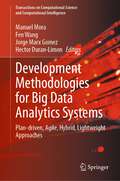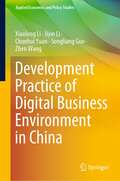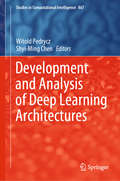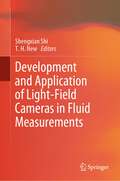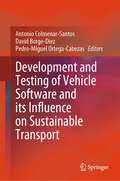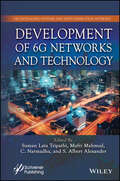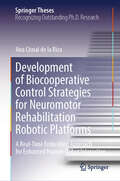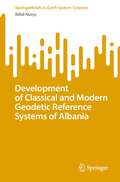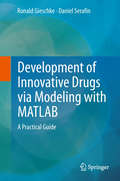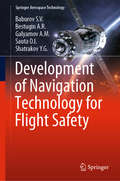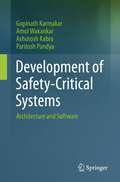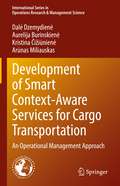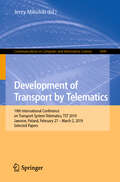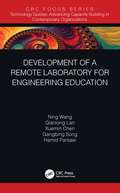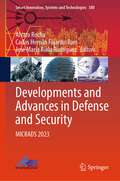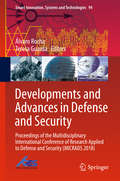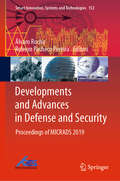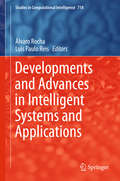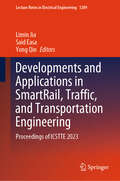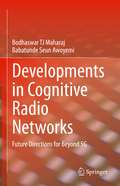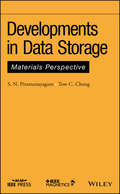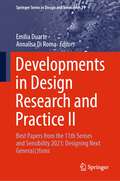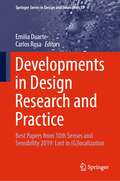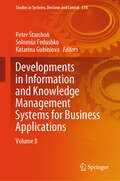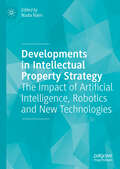- Table View
- List View
Development Methodologies for Big Data Analytics Systems: Plan-driven, Agile, Hybrid, Lightweight Approaches (Transactions on Computational Science and Computational Intelligence)
by Manuel Mora Jorge Marx Gomez Fen Wang Hector Duran-LimonThis book presents research in big data analytics (BDA) for business of all sizes. The authors analyze problems presented in the application of BDA in some businesses through the study of development methodologies based on the three approaches – 1) plan-driven, 2) agile and 3) hybrid lightweight. The authors first describe BDA systems and how they emerged with the convergence of Statistics, Computer Science, and Business Intelligent Analytics with the practical aim to provide concepts, models, methods and tools required for exploiting the wide variety, volume, and velocity of available business internal and external data - i.e. Big Data – and provide decision-making value to decision-makers. The book presents high-quality conceptual and empirical research-oriented chapters on plan-driven, agile, and hybrid lightweight development methodologies and relevant supporting topics for BDA systems suitable to be used for large-, medium-, and small-sized business organizations.
Development Practice of Digital Business Environment in China (Applied Economics and Policy Studies)
by Xiaolong Li Zhen Wang Chunhui Yuan Jiyin Li Songliang GuoThis book gives an in-depth research on digital business environment as well as its indicators analysis by means of collecting huge data and cases in China. Additionally, it’s on the first try to apply bibliometric method to business environment literature review. The main contents of this book contain the research on the connotation and evaluation indicator system of digital business environment, and a series of excellent practices in improving the business environment in China in the aspects of digital infrastructure construction, digital market order, digital security, digital government application, digital literacy and innovation, etc. The expected readers are scholars who study business environment-related topics, groups interested in digital business environment, businessmen and officials. The most significant features of this book lie in its novel topics and detailed cases, which can help readers to have a more comprehensive and in-depth understanding of China's digital business environment construction.
Development and Analysis of Deep Learning Architectures (Studies in Computational Intelligence #867)
by Witold Pedrycz Shyi-Ming ChenThis book offers a timely reflection on the remarkable range of algorithms and applications that have made the area of deep learning so attractive and heavily researched today. Introducing the diversity of learning mechanisms in the environment of big data, and presenting authoritative studies in fields such as sensor design, health care, autonomous driving, industrial control and wireless communication, it enables readers to gain a practical understanding of design. The book also discusses systematic design procedures, optimization techniques, and validation processes.
Development and Application of Light-Field Cameras in Fluid Measurements
by Shengxian Shi T. H. NewThis book provides a comprehensive guide to 3D Light-Field camera based imaging, exploring the working principles, developments and its applications in fluid mechanics and aerodynamics measurements. It begins by discussing the fundamentals of Light-Field imaging and theoretical resolution analysis, before touching upon the detailed optics design and micro-lens array assembly. Subsequently, Light-Field calibration methods that compensate for optical distortions and establish the relations between the image and real-word 3D coordinates are covered. This is followed by Light-Field 3D reconstruction algorithms which are elaborated for micrometer-scale particles and centimeter-scale physical models. Last but not least, implementations of the preceding procedures to selected fundamental and applied flow measurement scenarios are provided at the end of the book. Development and Application of Light-Field Cameras in Fluid Measurements gives an in-depth analysis of each topic discussed, making it ideal as both an introductory and reference guide for researchers and postgraduates interested in 3D flow measurements.
Development and Testing of Vehicle Software and its Influence on Sustainable Transport
by Antonio Colmenar-Santos David Borge-Diez Pedro-Miguel Ortega-CabezasThis book evaluates the contributions of the electronic control unit software of an electric vehicle on sustainability and society, such as the reduction of emissions during a product design and the improvements in the vehicle. A sustainable transport model is proposed, demonstrating its economic viability. By validating software in a more efficient way and adding new functionalities to the software to enhance driving efficiency, energy consumption can be significantly reduced. Therefore, software validation and development have a significant impact on sustainability. This book offers innovative validation solutions based on artificial intelligence techniques to reduce validation time and emissions. The impact of driving efficiency on sustainable transport models is studied in detail, making proposals to be considered in the current environmental policies under discussion within the European Union in order to improve the sustainability of transport models. Vehicles are becoming sophisticated electronic systems due to the fact that they are integrating a significant number of electronic control units. This trend will certainly continue in the year to come. Consequently, software validation techniques are a key element for car manufacturers in order to ensure the quality of the vehicle. This book contributes to these efforts.
Development of 6G Networks and Technology (Next Generation Computing and Communication Engineering)
by Suman Lata Tripathi Mufti Mahmud S. Albert Alexander C. NarmadhaThis book provides an in-depth exploration of the potential impact of 6G networks on various industries, including healthcare, agriculture, transport, and national security, making it an essential resource for researchers, scholars, and students working in the field of wireless networks and high-speed data processing systems. Development of 6G Networks and Technology explores the benefits and challenges of 5G and beyond that play a key role in the development of the next generation of internet. 6G is targeted to improve download speeds, eliminate latency, reduce congestion on mobile networks, and support advancements in technology. 6G has the potential to transform how the human, physical, and digital worlds interact with each other and the capability to support advancements in technology, such as virtual reality (VR), augmented reality (AR), the metaverse, and artificial intelligence (AI). Machine learning and deep learning modules are also an integral part of almost all automated systems where signal processing is performed at different levels. Signal processing in the form text, image, or video needs large data computational operations at the desired data rate and accuracy. Large data requires more use of IC area with embedded bulk memories that lead to power consumption. Trade-offs between power consumption, delay, and IC area are always a concern of designers and researchers. Energy-efficient, high-speed data processing is required in major areas like biomedicine and healthcare, agriculture, transport, climate change, and national security and defense. This book will provide a foundation and initial inputs for researchers, scholars, and students working in the areas of wireless networks and high-speed data processing systems. It also provides techniques, tools, and methodologies to develop next-generation internet and 6G.
Development of Biocooperative Control Strategies for Neuromotor Rehabilitation Robotic Platforms: A Real-Time Embedded Approach for Enhanced Human-Robot Interaction (Springer Theses)
by Ana Cisnal de la RicaThis book presents the development of a multimodal physiological signal acquisition system and cooperative control strategies for applications in upper-limb robotic rehabilitation. First, it introduces a non-pattern recognition EMG-based platform for hand rehabilitation, demonstrating its strong performance in both gesture recognition accuracy and responsiveness. It also discusses the role of EMG-based visual feedback, showing how real-time visualization of muscle activation enhances user performance during training. In turn, it reports on the validation of a low-cost multimodal acquisition solution using two different real-time biocooperative control strategies. The results demonstrate that the developed low-cost wearable platform, which integrates multiple sensors, wireless communication, and a high-efficiency real-time microcontroller, is highly versatile and configurable, and shows a good signal quality. By addressing two main aspects that limit the adoption of biocooperative systems in clinical rehabilitation settings – hardware affordability and system reliability – this outstanding Ph.D. thesis paves the way to the implementation of real-time biocooperative controls for future applications in robotic rehabilitation.
Development of Classical and Modern Geodetic Reference Systems of Albania (SpringerBriefs in Earth System Sciences)
by Bilbil NurçeThis book addresses the problems of mathematical relations between global and classical coordinate references from the practical applications point of view. It presents a large cartographic and numerical information set, which provides great values for practical and academical use based on the classical Albanian coordinative reference (ALB1986/ALB1987). This information is reflected from the positional point of view in the new modern Albanian satellite reference ALBPOS (Albanian Positioning System) or ALBCORS (Albanian Continuous Operation Reference Stations System). The main purpose of this Monograph is to summarize coordinative references applied in Albania in different periods, both classical and modern. Relevant transformation models between traditional/classical reference ALB1986 / ALB1987 and GNSS satellite reference are presented. The book furthermore recommends the mathematical models of the relationship in plan and height, between the Albanian classical reference and the global/European coordinate references (ITRF, EUREF). It serves to professionals involved in fundamental geodetic works as well as all working with GNSS or developing GIS applications.
Development of Innovative Drugs via Modeling with MATLAB
by Ronald Gieschke Daniel SerafinThe development of innovative drugs is becoming more difficult while relying on empirical approaches. This inspired all major pharmaceutical companies to pursue alternative model-based paradigms. The key question is: How to find innovative compounds and, subsequently, appropriate dosage regimens? Written from the industry perspective and based on many years of experience, this book offers: - Concepts for creation of drug-disease models, introduced and supplemented with extensive MATLAB programs - Guidance for exploration and modification of these programs to enhance the understanding of key principles - Usage of differential equations to pharmacokinetic, pharmacodynamic and (patho-) physiologic problems thereby acknowledging their dynamic nature - A range of topics from single exponential decay to adaptive dosing, from single subject exploration to clinical trial simulation, and from empirical to mechanistic disease modeling. Students with an undergraduate mathematical background or equivalent education, interest in life sciences and skills in a high-level programming language such as MATLAB, are encouraged to engage in model-based pharmaceutical research and development.
Development of Navigation Technology for Flight Safety (Springer Aerospace Technology)
by Sauta O.I. Shatrakov Y.G. Bestugin A.R. Baburov S.V. Galyamov A.M.This book highlights practical solutions for flight safety improvement techniques, which are currently the focus of the International Civil Aviation Organization (ICAO). It has become clear that, in order to rapidly and significantly improve flight safety, the integrated use of new aeronautical technologies is called for. Considering the size of the aviation fleet, its constant growth and the long service lives of aircraft, new technologies should be adapted both to cutting-edge air navigation systems and to those that have been used for over a decade. Concretely, the book discusses methodological approaches to the construction of ground and on-board avionics that make it possible to achieve improved flight safety using innovative new methods. The proposed approaches are illustrated with real-world examples of e.g. satellite-based navigation systems and enhanced ground proximity warning systems. The book is written for professionals involved in the development of avionics systems, as well as students, researchers and experts in the field of radiolocation, radio navigation and air traffic control, the book will support the development and modeling of radio technical complexes, as well as the analysis of complex radio technical systems.
Development of Safety-Critical Systems: Architecture and Software
by Gopinath Karmakar Amol Wakankar Ashutosh Kabra Paritosh PandyaThis book provides professionals and students with practical guidance for the development of safety-critical computer-based systems. It covers important aspects ranging from complying with standards and guidelines to the necessary software development process and tools, and also techniques pertaining to model-based application development platforms as well as qualified programmable controllers.After a general introduction to the book’s topic in chapter 1, chapter 2 discusses dependability aspects of safety systems and how architectural design at the system level helps deal with failures and yet achieves the targeted dependability attributes. Chapter 3 presents the software development process which includes verification and validation at every stage, essential to the development of software for systems performing safety functions. It also explains how the process helps in developing a safety case that can be independently verified and validated. The subsequent chapter 4 presents some important standards and guidelines, which apply to different industries and in different countries. Chapter 5 then discusses the steps towards complying with the standards at every phase of development. It offers a guided tour traversing the path of software qualification by exploring the necessary steps towards achieving the goal with the help of case studies. Chapter 6 highlights the application of formal methods for the development of safety systems software and introduces some available notations and tools which assist the process. Finally, chapter 7 presents a detailed discussion on the importance and the advantages of qualified platforms for safety systems application development, including programmable controller (PLC) and formal model-based development platforms. Each chapter includes case studies illustrating the subject matter.The book is aimed at both practitioners and students interested in the art and science of developing computer-based systems for safety-critical applications. Both audiences will get insights into the tools and techniques along with the latest developments in the design, analysis and qualification, which are constrained by the regulatory and compliance requirements mandated by the applicable guides and standards. It also addresses the needs of professionals and young graduates who specialize in the development of necessary tools and qualified platforms.
Development of Smart Context-Aware Services for Cargo Transportation: An Operational Management Approach (International Series in Operations Research & Management Science #330)
by Dalė Dzemydienė Aurelija Burinskienė Kristina Čižiūnienė Arūnas MiliauskasWith a focus on cargo transportation, this book addresses the development of approaches intended to secure an infrastructure of smart services to support the adaptive implementation of online multi-modal freight transport management processes. It discusses the development of multi-criteria decision-making components and their integration into the multi-layered computer-based information management of intelligent systems. Through detailed descriptions of various components of intelligent transport management systems, the book demonstrates how to develop the services needed in the right place and at the right time, and how to properly adapt to user needs, making necessary interventions to ensure the safety of the transportation process. Further, it describes the main ways to increase the autonomy and efficiency of user-vehicle interaction and shows how Information and Communications Technology (ICT) structural support for current and past situations in AI-based systems can help to anticipate future developments in freight transportation.
Development of Transport by Telematics: 19th International Conference on Transport System Telematics, TST 2019, Jaworze, Poland, February 27 – March 2, 2019, Selected Papers (Communications in Computer and Information Science #1049)
by Jerzy MikulskiThis book constitutes selected papers from the 19th International Conference on Transport Systems Telematics, TST 2019, held in Jaworze, near Bielsko-Biala, Poland, in March 2019. The 31 full papers presented in this volume were carefully reviewed and selected from 104 submissions. They were organized in topical sections named: telematics in rail transport; telematics in road transport; telematics in marine transport; telematics in air transport; and general about telematics.
Development of a Remote Laboratory for Engineering Education (Technology Guides)
by Ning Wang Xuemin Chen Qianlong Lan Gangbing Song Hamid ParsaeiThe field of information technology continues to advance at a brisk pace, including the use of Remote Laboratory (RL) systems in education and research. To address the needs of remote laboratory development for such purposes, the authors present a new state-of-the-art unified framework for RL system development. Included are solutions to commonly encountered RL implementation issues such as third-party plugin, traversing firewalls, cross platform running, and scalability, etc. Additionally, the book introduces a new application architecture of remote lab for mobile-optimized RL application development for Mobile Learning (M-Learning). It also shows how to design and organize the remote experiments at different universities and make available a framework source code. The book is intended to serve as a complete guide for remote lab system design and implementation for an audience comprised of researchers, practitioners and students to enable them to rapidly and flexibly implement RL systems for a range of fields.
Developments and Advances in Defense and Security: MICRADS 2023 (Smart Innovation, Systems and Technologies #380)
by Álvaro Rocha José María Riola Rodríguez Carlos Hernán Fajardo-ToroThis book gathers the proceedings of the Multidisciplinary International Conference of Research Applied to Defense and Security (MICRADS 2023), held at Graduate School of the Colombian Air Force, in Bogota, Colombia, during July 6–8, 2023. It covers a broad range of topics in systems, communication, and defense; strategy and political–administrative vision in defense; and engineering and technologies applied to defense. Given its scope, it offers a valuable resource for practitioners, researchers, and students alike.
Developments and Advances in Defense and Security: Proceedings Of The Multidisciplinary International Conference Of Research Applied To Defense And Security (micrads 2018) (Smart Innovation, Systems And Technologies #94)
by Álvaro Rocha Teresa GuardaThis book includes a selection of articles from The 2018 Multidisciplinary International Conference of Research Applied to Defense and Security (MICRADS’18), held in Salinas, Peninsula de Santa Elena, Ecuador, from April 18 to 20, 2018. MICRADS is an international forum for researchers and practitioners to present and discuss the most recent innovations, trends, results, experiences and concerns in the various areas of defense and security, together with their technological development and applications. The main topics covered are: Information and Communication Technology in Education; Computer Vision in Military Applications; Engineering Analysis and Signal Processing; Cybersecurity and Cyberdefense; Maritime Security and Safety; Strategy, Geopolitics and Oceanopolitics; Defense planning; Leadership (e-leadership); Defense Economics; Defense Logistics; Health Informatics in Military Applications; Simulation in Military Applications; Computer Networks, Mobility and Pervasive Systems; Military Marketing; Military Physical Training; Assistive Devices and Wearable Technology; Naval and Military Engineering; Weapons and Combat Systems; Operational Oceanography. The book is aimed at all those dealing with defense and security issues, including practitioners, researchers and teachers as well as undergraduate, graduate, master’s and doctorate students.
Developments and Advances in Defense and Security: Proceedings of MICRADS 2019 (Smart Innovation, Systems and Technologies #152)
by Álvaro Rocha Robson Pacheco PereiraThis book gathers the proceedings of the Multidisciplinary International Conference of Research Applied to Defense and Security (MICRADS), held at the Military Engineering Institute, Rio de Janeiro, Brazil, from 8 to 10th May 2019. It covers a variety of topics in systems, communication and defense; strategy and political-administrative vision in defense; and engineering and technologies applied to defense. Given its scope, it offers a valuable resource for practitioners, researchers, and students alike.
Developments and Advances in Intelligent Systems and Applications (Studies in Computational Intelligence #718)
by Álvaro Rocha Luís Paulo ReisThis book primarily addresses Intelligent Information Systems (IIS) and the integration of artificial intelligence, intelligent systems and technologies, database technologies and information systems methodologies to create the next generation of information systems. It includes original and state-of-the-art research on theoretical and practical advances in IIS, system architectures, tools and techniques, as well as “success stories” in intelligent information systems. Intended as an interdisciplinary forum in which scientists and professionals could share their research results and report on new developments and advances in intelligent information systems, technologies and related areas – as well as their applications – , it offers a valuable resource for researchers and practitioners alike.
Developments and Applications in SmartRail, Traffic, and Transportation Engineering: Proceedings of ICSTTE 2023 (Lecture Notes in Electrical Engineering #1209)
by Limin Jia Yong Qin Said EasaThis book is a collection of original peer-reviewed contributions from the 2023 International Conference on SmartRail, Traffic, and Transportation Engineering, jointly organized by Beijing Jiaotong University, China Electrotechnical Society, Chinese Institute of Electronics and Central South University. It was held on July 28-30, 2023 in Changsha, China. Topics covered includes SmartRail systems, autonomous vehicles, energy efficiency, sustainable transportation, big data in transportation, and machine learning. Speakers discussed innovative technologies and strategies to improve the efficiency, reliability, and safety of rail networks, while exploring the opportunities and challenges of integrating autonomous vehicles into existing transportation networks. It provides valuable insights into the latest developments and trends in transportation engineering and technology, with a focus on electrification and sustainable transportation. It serves as a valuable resource for professionals, researchers, and students working in the field.
Developments in Cognitive Radio Networks: Future Directions for Beyond 5G
by Bodhaswar TJ Maharaj Babatunde Seun AwoyemiThis book provides holistic yet concise information on what modern cognitive radio networks are, how they work, and the possible future directions for them. The authors first present the most generic models of modern cognitive radio networks, taking into consideration their different architectural designs and classifications. While the spectrum resource is shown to be the most important resource for the cognitive radio networks, the book exposes the importance of the other resources that are needed to help drive the technology. The book then discusses in-depth the key tools (such as optimization and queuing theory) and techniques (such as cooperative diversity and relaying) that are being employed to formulate resource problems, investigate solutions, and interpret such solutions for useful and practical modern cognitive radio networks realization. Further, the book studies the impact of modern cognitive radio networks on other emerging technologies -- such as 5G, Internet of Things, and advanced wireless sensor networks -- and discusses the role that cognitive radio networks play in the evolution of smart cities and in the realization of a highly interconnected world. In discussing the future of the cognitive radio networks, the book emphasizes the need to advance new or improved tools, techniques, and solutions to address lingering problems in the aspects of resource realization and utilization, network complexity, network security, etc., which can potentially limit the cognitive radio networks in their stride to becoming one of the most promising technologies for the immediate and near future.
Developments in Data Storage: Materials Perspective
by Tow C. Chong S. N. PiramanayagamA timely text on the recent developments in data storage, from a materials perspective Ever-increasing amounts of data storage on hard disk have been made possible largely due to the immense technological advances in the field of data storage materials. Developments in Data Storage: Materials Perspective covers the recent progress and developments in recording technologies, including the emerging non-volatile memory, which could potentially become storage technologies of the future. Featuring contributions from experts around the globe, this book provides engineers and graduate students in materials science and electrical engineering a solid foundation for grasping the subject. The book begins with the basics of magnetism and recording technology, setting the stage for the following chapters on existing methods and related research topics. These chapters focus on perpendicular recording media to underscore the current trend of hard disk media; read sensors, with descriptions of their fundamental principles and challenges; and write head, which addresses the advanced concepts for writing data in magnetic recording. Two chapters are devoted to the highly challenging area in hard disk drives of tribology, which deals with reliability, corrosion, and wear-resistance of the head and media. Next, the book provides an overview of the emerging technologies, such as heat-assisted magnetic recording and bit-patterned media recording. Non-volatile memory has emerged as a promising alternative storage option for certain device applications; two chapters are dedicated to non-volatile memory technologies such as the phase-change and the magnetic random access memories. With a strong focus on the fundamentals along with an overview of research topics, Developments in Data Storage is an ideal reference for graduate students or beginners in the field of magnetic recording. It also serves as an invaluable reference for future storage technologies including non-volatile memories.
Developments in Design Research and Practice II: Best Papers from the 11th Senses and Sensibility 2021: Designing Next Genera(c)tions (Springer Series in Design and Innovation #31)
by Emilia Duarte Annalisa Di RomaThis book reports on innovative research and practices in contemporary design, showing how to integrate different concepts and discussing the emerging role of design in different field, its meaning for humans and citizens, as well as its impact on society and the global ecosystem. Gathering the best papers from Senses & Sensibility, held on December 9-11, 2021 in Bari, Italy, it highlights the role of design in fostering education, physical and social wellbeing, industrial innovation and cultural preservation, as well as inclusivity, sustainability and communication in a world facing complex challenges on a global scale.
Developments in Design Research and Practice: Best Papers from 10th Senses and Sensibility 2019: Lost in (G)localization (Springer Series in Design and Innovation #17)
by Emilia Duarte Carlos RosaThis book reports on innovative research and practices in contemporary design, showing how to integrate different concepts and discussing the emerging role of design in different field, its meaning for humans and citizens, at both local and global level. Gathering the best papers from Senses & Sensibility, held in 2019 in Lisbon, Portugal, it highlights the role of design in fostering education, physical and social wellbeing, industrial innovation and cultural preservation, as well as inclusivity, sustainability and communication in a global, digital world.
Developments in Information and Knowledge Management Systems for Business Applications: Volume 8 (Studies in Systems, Decision and Control #578)
by Solomiia Fedushko Peter Štarchoň Katarína GubíniovaIn this series, we delve into the challenges and opportunities of managing business information efficiently. We explore various aspects of information processing for effective enterprise management, including methods, techniques, and strategies. Our goal is to provide solutions for competent information management that increases business usage, while also analyzing strategies to reduce data loss and improve customer satisfaction and maintenance levels. Our book offers practical knowledge on different facets of information and knowledge management in businesses, such as information processing theory and models, the benefits and implementation challenges of information/knowledge business, and information management methods for creating a global information society. We also cover topics such as collecting and analyzing data for enterprise management, modern business intelligence solutions and data management, information marketing, and innovative development of the enterprise information system. Our focus is on applications, benefits, and encounters within the field of efficient business information processing, and we offer solutions to increase performance using the latest IT technologies.
Developments in Intellectual Property Strategy: The Impact of Artificial Intelligence, Robotics and New Technologies
by Nadia NaimResearch in the area of intellectual property (IP) is increasingly relevant to the rapidly growing artificial intelligence (AI) and robotics industries, affecting the legal, business, manufacturing, and healthcare sectors. This contributed volume aims to develop our understanding of the legal and ethical challenges posed by artificial intelligence and robotics technologies and the appropriate intellectual property based legal and regulatory responses. It provides a philosophical and legal framework for considering concepts and principles that relate to the development and use of such technologies at the international, regional, and national levels. The legal discourse in IP concerns the ever-growing AI sector and how businesses can protect their IP and incorporate AI. Moral sentiments often take a back seat to market sentiments, even in shaping the direction of ethical business strategy. This anomaly persists despite growing interest in ethics and IP. Taking an interdisciplinary and diverse perspective, this book enriches the evolving definition and scope of IP literature by focusing on actors, products and regulation that shape the business sector. Considering the gap between theory and practice, this book bridges academic and professional knowledge in unpacking legal, ethical and governance issues in the intellectual property industry. In an effort to include as many viewpoints as possible, contributions have been gathered from diverse fields, including business, ethics, governance, law, philosophy and technology studies. This book will appeal to academics in the field of intellectual property, business ethics, AI, emerging technologies and strategic innovation, as well as practitioners and policy makers.
